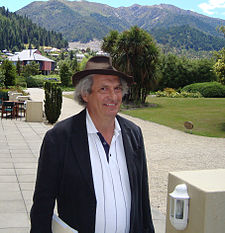- Persi Diaconis
-
Persi Diaconis 
Persi Diaconis, 2010Born January 31, 1945 Nationality  American
AmericanFields Mathematics Institutions Harvard University
Stanford UniversityAlma mater City College of New York B.S. (1971)
Harvard University M.A. (1972), Ph.D. (1974)Doctoral advisor Dennis Arnold Hejhal
Frederick Mosteller[1]Doctoral students Sourav Chatterjee
Arif ZamanPersi Warren Diaconis (born January 31, 1945) is an American mathematician and former professional magician.[2][3] He is the Mary V. Sunseri Professor of Statistics and Mathematics at Stanford University.[4][5] He is particularly known for tackling mathematical problems involving randomness and randomization, such as coin flipping and shuffling playing cards.
Contents
Card shuffling
See also: ShufflingProfessor Diaconis received a MacArthur Fellowship in 1982, and again in 1992 after the publication (with Dave Bayer) of a paper entitled "Trailing the Dovetail Shuffle to Its Lair"[6] (a term coined by magician Charles Jordan in the early 1900s) which established rigorous results on how many times a deck of playing cards must be riffle shuffled before it can be considered random according to the mathematical measure total variation distance. Diaconis is often cited for the simplified proposition that it takes seven shuffles to randomize a deck. More precisely, Diaconis showed that it takes 5 shuffles before the total variation distance of a 52-card deck begins to drop significantly from the maximum value of 1.0, and 7 shuffles before it drops below 0.5, after which it is reduced by a factor of 2 every shuffle.
Diaconis has coauthored several more recent papers expanding on his 1992 results and relating the problem of shuffling cards to other problems in mathematics.
More recently, some have questioned this result, arguing that the measure of randomness is too demanding, and that six shuffles are enough [7]
Diaconis and colleagues have published follow-up papers, showing that the separation distance of an ordered blackjack deck (that is, aces on top, followed by 2's, followed by 3's, etc.) drops below .5 after 7 shuffles. Separation distance is an upper bound for variation distance.[8][9]
Biography
Diaconis left home at 14[10] to travel with sleight-of-hand legend Dai Vernon, and dropped out of high school, promising himself that he would return one day so that he could learn all of the math necessary to read William Feller's famous two-volume treatise on probability theory, An Introduction to Probability Theory and Its Applications. He returned to school (City College of New York for his undergraduate work graduating in 1971 and then a Ph.D. in Mathematical Statistics from Harvard University in 1974), learned Feller, and became a mathematical probabilist. [11]
According to Martin Gardner, at school Diaconis supported himself by playing poker on ships between New York and South America. Gardner recalls that Diaconis had "fantastic second deal and bottom deal".[12]
Diaconis is married to Stanford statistics professor Susan Holmes.
Recognition
- 1982 - Awarded the Rollo Davidson Prize.
- 2003 - Received an honorary D. Sci. degree from the University of Chicago.[13]
- 2006 - Awarded the Van Wijngaarden Award.
Works
- Diaconis, Persi (1988). Group representations in probability and statistics. Institute of Mathematical Statistics. ISBN 0-940600-14-5.
- "Theories of data analysis: from magical thinking through classical statistics", in Hoaglin, D.C et al. (eds) (1985). Exploring Data Tables Trends and Shapes. Wiley. ISBN 0-471-09776-4.
- Diaconis, P. (1978). "Statistical problems in ESP research". Science 201 (4351): 131–136. doi:10.1126/science.663642. PMID 663642.
See also
- Freedman–Diaconis rule
- Patience sorting
- Random walk
- Mathemagician
References
- ^ Persi Diaconis at the Mathematics Genealogy Project.
- ^ Hoffman, J. (2011). "Q&A: The mathemagician". Nature 478 (7370): 457. doi:10.1038/478457a.
- ^ Diaconis, Persi; Graham, Ron (2011), Magical Mathematics: The Mathematical Ideas that Animate Great Magic Tricks, Princeton, N.J: Princeton University Press, ISBN 0-691-15164-4, http://press.princeton.edu/titles/9510.html
- ^ "Stanford University - Persi Diaconis". http://www-stat.stanford.edu/~cgates/PERSI/. Retrieved 2011-10-27.
- ^ "It’s no coincidence: Stanford University mathematician and statistician Persi Diaconis will serve as a Patten Lecturer at Indiana University Bloomington". http://www.homepages.indiana.edu/022704/text/persi.shtml. Retrieved 2011-10-27.
- ^ Bayer, D.; Diaconis, P. (1992). "Trailing the Dovetail Shuffle to its Lair". The Annals of Applied Probability 2 (2): 294. doi:10.1214/aoap/1177005705.
- ^ Trefethen, L. N.; Trefethen, L. M. (2000). "How many shuffles to randomize a deck of cards?". Proceedings of the Royal Society A: Mathematical, Physical and Engineering Sciences 456 (2002): 2561. doi:10.1098/rspa.2000.0625.
- ^ "Shuffling the cards: Math does the trick". Science News. Friday, November 7, 2008. http://www.sciencenews.org/view/generic/id/38434/title/Shuffling_the_cards_Math_does_the_trick. Retrieved 14 November 2008. "Diaconis and his colleagues are issuing an update. When dealing many gambling games, like blackjack, about four shuffles are enough"
- ^ Assaf, S.; Diaconis, P.; Soundararajan, K. (2011). "A rule of thumb for riffle shuffling". The Annals of Applied Probability 21 (3): 843. doi:10.1214/10-AAP701.
- ^ Lifelong debunker takes on arbiter of neutral choices
- ^ Jeffrey R. Young, "The Magical Mind of Persi Diaconis" Chronicle of Higher Education October 16, 2011 [1]
- ^ Interview with Martin Gardner, Notices of the AMS, June/July 2005.
- ^ Salsburg, David (2001). The lady tasting tea: how statistics revolutionized science in the twentieth century. New York: W.H. Freeman and CO. ISBN 0-8050-7134-2.. Cf. p.224
Categories:- 1945 births
- Members of the United States National Academy of Sciences
- Living people
- MacArthur Fellows
- American mathematicians
- 20th-century mathematicians
- 21st-century mathematicians
- Probability theorists
- American magicians
- American statisticians
- Stanford University faculty
- Scientists at Bell Labs
- Presidents of the Institute of Mathematical Statistics
- ISI highly cited researchers
Wikimedia Foundation. 2010.
